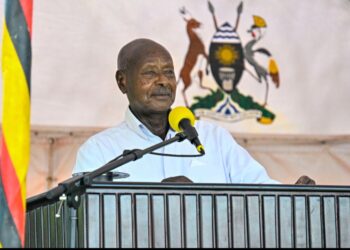The ministry of Education and Sports has drawn strategies to ensure effective implementation of specific standard operating procedures (SOPs) for the phased reopening of the educational institutions.
A few days ago government announced that schools will be reopened on 20 September, 2020.
According to a letter recently written by the Minister of Education Janet Kataha Museveni to Finance Minister Matia Kasaija seeking the release of capitation grants to schools, the focus will be on candidate classes to resume, for what would be a second term.
Education authorities have therefore revised the Academic Year schedule to allow students to report for the ‘second term of school this month’, as part of the phased reopening of educational institutions across the country.
The Academic Year was prematurely cut short on March 18, 2020, as a precautionary measure to control the spread of the Coronavirus (COVID-19). As a result, over 15 million learners who are enrolled in schools at different education levels have been at home since the lockdown.
Here the SOPs that schools must follow when they are reopened:
1. Prior to reopening, the management of each education institution serving as quarantine centres shall undertake to ensure that if their institution is disinfected and confirmed as safe for resumption operations. The disinfection shall be done with support of the respective district COVID-19 taskforce.
2. The management of all education institutions shall hold a staff meeting to discuss the implementation of the SOPs within the institution and agree on appropriate classrooms and dormitory spaces to ensure physical spacing of 2 meters between learners in class and in dormitories
3. Each institution shall constitute a COVID-19 taskforce of not more than seven (7) members, including two (2) learners and a member of the support staff.
4. Each class/lecture room shall have a student monitor responsible for promoting compliance to COVID-19 control and safety measures
5. All education institutions shall ensure the proper use of facial masks that must be worn at all times. Each learner should have a minimum of two face masks.
6. Education institutions shall take every precaution to ensure that no learner, who is reported to have entered the country illegally, is allowed into institution premises. Such learners should be reported to the relevant authorities for necessary action.
7. Education institutions shall restrict entry to their premises by members of the public.
8. Education institutions should provide extra support to safeguard vulnerable learners, including SNE learners, and learners with identified health conditions.
9. Institutions should establish or strengthen collaboration with Covid-19 District Taskforce and social service providers for continuity of critical services in institutions such as health screening, school feeding programs, guidance and counseling.
10. Each institution should appoint a member of staff from the established Covid-19 taskforce to be a Community Liaison Officer (CLO). The CLO shall coordinate the institution’s relationship and engagement with the community to promote observance of Covid-19 control measures.
11. Institutions should guide and counsel learners against Covid-19 related stigmatization.
12. All education institutions should conduct behavior change and health education sessions for staff and learners and provide reminders on safety, in form of posters, on safe behaviour.
13. Each institution should re-arrange the sitting of learners using all available rooms within the school to ensure the required social distancing. This may include use of libraries, laboratories, dining halls, main halls where available.
14. Where classrooms have temporary partitions, institutions should remove the partitions to create larger rooms for ample sitting and aeration/ventilation.
15. Where available, main halls, dining halls and other large rooms should be prioritized for use as classrooms to ensure that available teachers cater for a sizeable number of learners per class. However, there should not be more than seventy (70) learners in a room/hall of any size for a lesson or other purposes.
16. A foot-operated hand washing facility shall be placed at strategic point of access to each block (and floor where applicable) used by learners and staff.
17. Safe temporary shelters, such as tents, may be used as classrooms. Open air spaces, such as tree shades may be improvised as temporary venues for some classes.
18. There shall be no group and close contact co-curricular activities in all education institutions until further notice. Nevertheless, learners should be guided to engage in physical activities while observing the social distancing of at least two metres.
19.All education institutions shall avoid general assemblies that bring together a large number of students.
20. There shall be no external mocks or other external examinations organized for students in secondary and primary schools.
21. Institution heads should ensure that all staff integrate COVID-19 awareness and prevention messages in every lesson.
22. There shall be no career days, class days or official visitation days, in education institutions until further notice.
23. Mid-morning and lunch breaks shall be staggered and fully supervised by the teachers for adherence to social distancing, wearing of face masks and hand washing.
24. Institutions with large numbers of candidate/final year classes, which cannot be accommodated in the available classrooms at the social distancing of two metres, shall make arrangements to operate either:
a. Morning and afternoon shifts. Where this is applicable, the morning shift shall end at 12:30pm and the afternoon shift shall start at 2:00pm to allow for disinfection of the affected surfaces before the next shift or
b. An alternate-day attendance schedule where different streams attend on alternate days as may be deemed appropriate, in a bid to ensure that numbers are manageable.
25. For boarding institutions, after-class afternoon and evening programmes shall not involve team or group and close contact sports or activities; and they shall be supervised by a dedicated team of staff. Every dormitory shall have a resident tutor to supervise adherence to the SOPs.
26. Institutions should not keep learners beyond the official school closing time.
27. Schools that do not employ a qualified and dedicated health worker shall establish a formal collaboration with a health facility within a radius of 5kms for quick response and management of emerging health issues.
28. Each education institution shall work closely with the district Covid-19 taskforce to organize basic training for its staff on management of Covid-19.
29. Institutions shall build staff awareness and knowledge on Covid-19 safety measures through regular sharing of accurate information and literature.
30. Education institutions shall ensure that restrictions are in place to prevent teachers from part-timing in multiple institutions and thereby increasing the risk of spreading infection among institutions.
31. Heads of institutions should ensure that only staff members who are on duty are present at the institution on a given day.
Do you have a story in your community or an opinion to share with us: Email us at editorial@watchdoguganda.com












